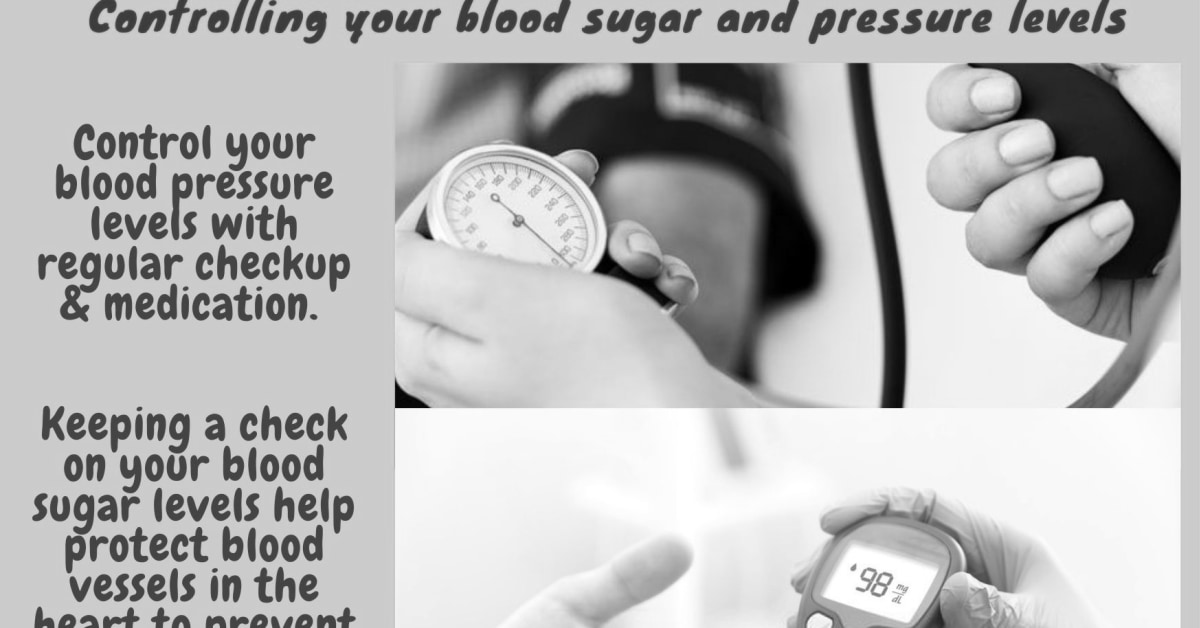
High blood pressure, also known as hypertension, is a common cardiovascular condition that affects millions of people worldwide. It occurs when the force of blood against the walls of your arteries is consistently too high, putting extra strain on your heart and blood vessels. If left untreated, high blood pressure can lead to serious health problems such as heart disease, stroke, and kidney failure. In this article, we will discuss how you can manage high blood pressure through lifestyle changes and medication, and provide you with tips for maintaining a healthier heart. Whether you have been diagnosed with high blood pressure or are looking to prevent it, this article is for you. So, let’s dive in and learn how to keep your blood pressure under control for a healthier and happier life.
To effectively manage high blood pressure, it is important to understand the causes and risk factors associated with this condition. Some of the common risk factors include unhealthy eating habits, lack of physical activity, smoking, excessive alcohol consumption, and family history. It is important to address these factors and make necessary changes to your lifestyle in order to keep your blood pressure under control.
Diet plays a crucial role in managing high blood pressure. A diet rich in fruits, vegetables, whole grains, and low-fat dairy products can help lower blood pressure. Foods that are high in sodium, saturated fats, and cholesterol should be limited or avoided altogether. Additionally, incorporating regular physical activity into your routine can also help reduce blood pressure. Aim for at least 30 minutes of moderate exercise, such as brisk walking or cycling, on most days of the week.
In addition to lifestyle changes, medication may also be prescribed by your doctor to help manage high blood pressure. These medications work by either relaxing the blood vessels or reducing the amount of fluid in the body, making it easier for the heart to pump blood. It is important to take your medication as directed and to regularly monitor your blood pressure to ensure it stays within a healthy range.
Other preventative measures that can help lower your risk of developing cardiovascular diseases include quitting smoking, limiting alcohol consumption, managing stress levels, and getting regular check-ups to monitor your blood pressure and overall heart health.
Medication
Your doctor may prescribe medication to help manage high blood pressure. It is important to take it as directed.
Preventative Measures
Quitting smoking, limiting alcohol consumption, and managing stress are important preventative measures for maintaining a healthy cardiovascular system. These lifestyle changes can significantly decrease the risk of developing cardiovascular diseases such as high blood pressure, heart disease, heart attacks, and strokes.
Physical Activity
Regular exercise is crucial in lowering blood pressure and improving overall heart health. Not only does physical activity help to reduce blood pressure, but it also helps to strengthen the heart and improve blood flow. This can reduce the strain on the heart and lower the risk of heart disease, heart attacks, and strokes.
There are many different types of physical activity that can be beneficial for managing high blood pressure. These include aerobic exercises such as walking, jogging, cycling, and swimming. These activities help to get your heart rate up and improve cardiovascular fitness. Resistance training, such as weightlifting, can also be beneficial for lowering blood pressure.
It is recommended to aim for at least 30 minutes of moderate-intensity exercise, five times a week. This can be broken down into smaller increments throughout the day if needed. It is important to find activities that you enjoy and can sustain in the long term.
In addition to lowering blood pressure, regular physical activity also has many other benefits for overall heart health. It can help to improve cholesterol levels, reduce inflammation, and manage stress levels. All of these factors contribute to a healthier cardiovascular system.
Dietary Changes
Incorporating a healthy diet into your lifestyle can have a significant impact on managing high blood pressure. A diet rich in whole grains, fruits, vegetables, and low-fat dairy products can help lower blood pressure and reduce the risk of heart disease.
One key aspect of managing high blood pressure through dietary changes is reducing sodium intake. The American Heart Association recommends limiting sodium intake to no more than 2,300 milligrams per day, with an ideal limit of no more than 1,500 milligrams per day for most adults. This can be achieved by choosing low-sodium or no-sodium options when grocery shopping and avoiding processed and packaged foods that tend to be high in sodium.
In addition to limiting sodium, increasing potassium intake can also be beneficial for managing high blood pressure. Potassium helps counteract the effects of sodium and can be found in foods such as bananas, sweet potatoes, spinach, and avocados.
Another important aspect of a healthy diet for managing high blood pressure is reducing saturated and trans fats. These types of fats can raise cholesterol levels and increase the risk of heart disease. Instead, opt for healthier fats such as monounsaturated and polyunsaturated fats found in foods like olive oil, nuts, and fatty fish.
Incorporating dietary changes into your lifestyle may seem daunting at first, but small changes can make a big difference. Start by adding more fruits and vegetables to your meals and gradually reduce your intake of processed and high-sodium foods. You can also consult with a registered dietitian for personalized recommendations on how to best manage your blood pressure through diet.
By making positive lifestyle changes and following your doctor’s advice, you can effectively manage high blood pressure and reduce your risk of developing serious cardiovascular conditions. Remember to regularly monitor your blood pressure and seek medical attention if you experience any concerning symptoms. Your heart health is in your hands.